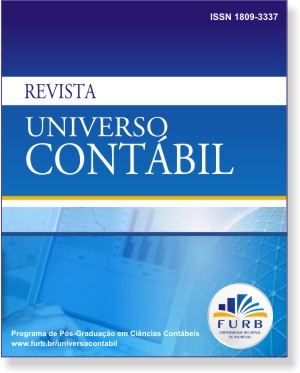A CONTABILIDADE COMPORTAMENTAL E OS EFEITOS COGNITIVOS NO PROCESSO DECISÓRIO: UMA AMOSTRA COM OPERADORES DA CONTABILIDADE
DOI :
https://doi.org/10.4270/ruc.20117Mots-clés :
Contabilidade Comportamental, Processo Decisório, Operadores da Contabilidade.Résumé
O estudo tem como objetivo investigar os efeitos cognitivos direcionados aos Operadores da Contabilidade: Heurística da Representatividade, Excesso de Confiança, Efeito Disponibilidade e Heurística da Relatividade, com base na Contabilidade. Quanto aos procedimentos metodológicos empregados, realizou-se pesquisa de base descritiva e de levantamento, com abordagem indutiva. Um questionário com seis perguntas foi aplicado em duas etapas: via e-mail para os auditores do Cadastro Nacional dos Auditores Independentes (CNAI) e do Instituto dos Auditores Independentes do Brasil (IBRACON) (137 auditores) e para os contadores distribuídos por todo o Brasil (722 contadores); e in loco com os auditores internos das Contas Públicas do Estado da Paraíba (50 auditores). Os dados desse estudo foram tratados com o auxílio do Microsoft Office Excel® e do software Statiscical Package for the Social Sciences (SPSS). Os testes utilizados foram: o Teste Qui-Quadrado de Pearson para Independência, o Teste Exato de Fisher e o Teste de Phi e Cramer’s V, todos ao nível de significância de 5%. Os resultados mostraram que os Operadores da Contabilidade, dependendo das situações empregadas, são influenciados pelos efeitos cognitivos de excesso de confiança, heurística da relatividade (efeito ancoragem) e julgamentos probabilísticos.Téléchargements
Téléchargements
Publié-e
Comment citer
Numéro
Rubrique
Licence
Os direitos autorais para artigos publicados nesta revista são do autor, com direitos de primeira publicação para a revista. Em virtude de aparecerem nesta revista de acesso público, os artigos são de uso gratuito, com atribuições próprias, em aplicações educacionais e não-comerciais. A revista permitirá o uso dos trabalhos publicados para fins não-comerciais, incluindo direito de enviar o trabalho para bases de dados de acesso público. Os artigos publicados são de total e exclusiva responsabilidade dos autores.
• O(s) autor(es) autoriza(m) a publicação do artigo na revista;
• O(s) autor(es) garante(m) que a contribuição é original e inédita e que não está em processo de avaliação em outra(s) revista(s);
• A revista não se responsabiliza pelas opiniões, ideias e conceitos emitidos nos textos, por serem de inteira responsabilidade de seu(s) autor(es);
• É reservado aos editores o direito de proceder ajustes textuais e de adequação do artigo às normas da publicação;
• O(s) autor(es) declaram que o artigo não possui conflitos de interesse.


